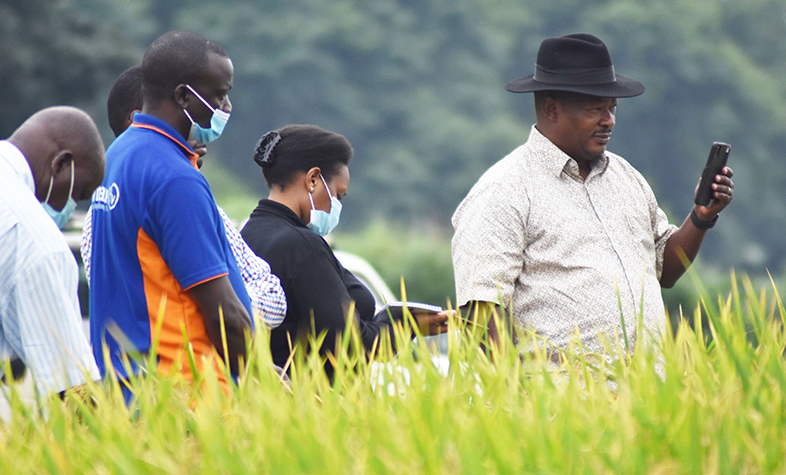News
NARO’s 30 new crop varieties, a timely intervention amid global food shortages

NARO DG Dr. Ambrose Agona (with cap) inspecting a trial of the rice variety that resembles Basimati, which has been released. Photo: Internet.
The National Agricultural Research Organisation (NARO) has taken a major leap forward in its research mandate by releasing a record 30 new crop varieties during the last financial year that are ready for adoption by farmers in Uganda and possibly in the region and beyond. The 30 varieties are a major improvement from the previous release of nine varieties that were recorded in 2019.
The release of new high-yielding and disease tolerant varieties with good processing qualities, present the country with perfect alternatives to substitute food commodities that are imported from abroad which cost the country scarce foreign exchange.
NARO’s Director General Dr. Ambrose Agona revealed in a documentary titled NARO’s Achievements 2021-2022 that is available on YouTube indicating that the varieties have been submitted to the Varieties Release Committee of the Ministry of Agriculture Animal Industry and Fisheries for approval.
The new innovations are; 4 rice varieties, 11 sorghum varieties, 3 wheat varieties, four high-oil content groundnuts, three for Cassava, three Sweet Potatoes and two Irish Potatoes.
The news has attracted praise from analysts of the agricultural sector, some of whom note that the new technologies are timely considering the evolving new challenges such as diminishing plots of land due to rapid population growth which requires higher-yielding varieties to ensure that more food is produced to meet growing demand, as well as new diseases and other environmental stresses such as climate change.
Isaac Ongu, the Executive Director of the Science Foundation for Livelihoods and Development (SCIFODE) praised NARO saying: “As a public research body, NARO has done a good job in developing crops that meet the government’s core objective of ensuring food security.”
The intervention by Uganda’s premier agricultural research body, towards filling the country’s growing demand for food will also likely be celebrated by the government in its efforts geared towards saving scarce foreign exchange through import substitution of previously imported food items such as rice and wheat and cooking oil.
Dr. Agona further revealed that the varieties released are part of a total of 100 technologies and products that include value-addition machines, and other discoveries that have been realized over the last one year by the institution.
Speaking to The Sunrise, Dr. Sadik Kassim, NARO’s new Deputy Director for Agricultural Technology Promotion, attributed the huge leap in variety releases to ‘the coming of age of a number of breeding systems’ and other technologies that have been under development over the past couple of years.
“Over time, NARO has been developing what we would call breeding systems or technology development pipelines. Now they are at their peak. This explains the improvement in performance,” said Dr. Kassim.
He added that over time NARO has been building capacity in different disciplines. “We have improvements in competence, qualification and level of expertise especially in various commodities in which we produce new varieties.”
Dr. Kassim also paid tribute to the strong support the institution has received from international partners as well as from the government of Uganda that have funded the institution to scale up research activities. Some of the vital support includes support for NARO scientists to pursue PhD studies, which helps them to contribute towards variety and other technologies as part of their academic qualification.
Other forms of support have come from international institutions such as the International Center for Maize and Wheat (CIMMYT) as well as the Nairobi-based African Agricultural Technology Foundation (AATF), which helps African agricultural research institutions gain access to royalty-free technologies that are embedded in the production of new varieties.
Dr. Kassim noted that none the new varieties are a product of genetic engineering. However, this writer understands that some of the institution has adopted a number of modern plant breeding methods such as tissue culture, to multiply seed which has helped to speed up the research processes hence the increase in the varieties.
Import substitution key
The release of new varieties for rice, wheat and oil-rich groundnuts have been especially cheered by watchers of the sector, considering the fact that the country has over the years increased imports of the same food items, largely due to urbanization and the corresponding changes in people’s lifestyles.
According to the website TrendEconomy.com which compiles trade statistics of major traded items across the world, Uganda imported wheat valued at US$151m in 2020, a major increase from US$111m that it imported in 2008.
The country’s growing dependency on wheat has seen it embrace a wide range of wheat-based fast foods as some of the country’s food and tourist attractions. The introduction of the Rolex Festival in recognition of the popularity of the Rolex Chapati – a combination of Chapati and Eggs by the government and tourism industry, attests to the country’s shifting food tastes.
And yet, although the country’s wheat production has remained largely low in recent years due to common wheat diseases but also due to under-investment in the sector, reports suggest that Uganda can produce a significant amount of its wheat needs, if deliberate steps are taken to improve varieties but also address other constraints like water scarcity.
The latest introduction of three new wheat varieties that are tolerant to common diseases, are higher yielding, enriched with Zinc and Iron besides being faster maturing, (90-100 days) could be a game-changer in the country’s efforts to reverse the unfavorable trends in the economics of wheat trade experienced in recent years.
The recent increase in global wheat prices largely due to the war between Russia and Ukraine, two of the world’s largest wheat producers, has added new urgency for Uganda to find local solutions to the global food crisis.
President Yoweri Museveni’s call for Ugandans to switch from bread to cassava following outcry over the high prices of wheat, was met with mixed feelings as some people posted raw or cooked tubers perhaps to depict the low levels of value addition to meet the country’s tastes.
But as Dr. Agona noted, NARO through its Food Biosciences and Agri-Business Centre located at Kawanda, has now developed a formula for producing bread by mixing wheat and maize flour.
Still, despite the improvements in the number of varieties released, Dr. Kassim told The Sunrise that they continue to use conventional breeding technologies. This is because the government continues to maintain cold feet more modern plant breeding technologies such as genetic engineering, as shown by its reluctance to assent to the GMO products.
But Ongu observed that while NARO’s efforts towards addressing food security and declining productivity are commendable, the institution and the government need to change its focus from merely food security and expand their scope towards industrialization.
Ongu says that Uganda has enormous potential to use crop and other agricultural resources to provide raw materials for industrialization. By expanding the scope of the agricultural sector, Ongu says, this would greatly empower researchers to produce even more products aiming to tap into more opportunities beyond just food availability.
“The crop varieties that NARO has released over the years are adequate to address food security needs of our country. The challenge remains transforming the mode of production from subsistence to commercialization of agriculture,” Ongu says, adding that the government needs to find ways of supporting the private middle class of Ugandans which has land and interest in agriculture, but lacks equipment such as grain driers, tractors and storage facilities to be able to take advantage of the new varieties.
“Currently, we cannot store food that may be produced for 2 to 3 years as are other countries like South Africa. This deprives us of a huge market not only for food but also for industries that need an assured supply of quality agricultural produce.”
Ongu decried the absence of a support mechanism from the government and donor community geared towards supporting the private sector to be able to utilize the land that they are acquiring rapidly.
Biotec use in addressing diseases
Although the science of genetic engineering in crops continues to face obstacles, due to the absence of an enabling law, NARO’s Director General expressed optimism that the science may soon see green light from regulators in order to help produce vaccines.
He said NARO scientists have isolated four major viruses that cause the Food and Mouth Disease (FMD) a major disease that costs the country and farmers more than UGX3 trillion in lost animals and markets.
“Our scientists are going to extract antigens so that we’re able to produce FMD vaccines,” said Agona.
Similar progress has been made by NARO scientists in the management of the East African Swine Fever, a major disease constraint for piggery farmers in Uganda.
According to Agona, scientists have developed a testing kit that can be able to detect the presence of the disease almost instantly. Like vaccines, such kits use anti-bodies to detect the presence of a virus, which helps to control the spread of such a disease.
But as Ongu, observed, if the government would support the private sector to commercialize the technologies for greater value addition, this would help address food security by creating an incentive for investors, it would also help to transform the economy by generating better-paying jobs for many young people who graduate in both science and non-science fields but are able to work in factories.
With such a wider scope, Ongu is confident that demand for seed for the new varieties will even expand among the Ugandan farming community.
Comments
























